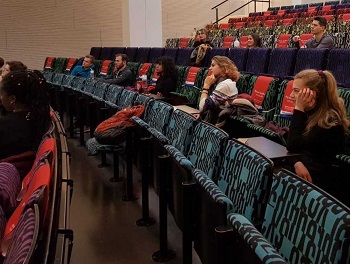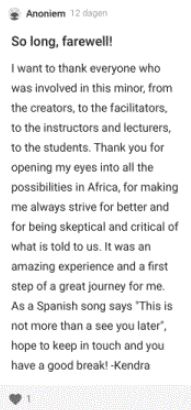LDE minor African Dynamics – the added value of online learning
No less than 36 students from Leiden University, Technical University Delft and Erasmus University Rotterdam followed the minor African Dynamics 2020-2021. Their disciplines ranged from Applied Earth Sciences, Industrial Design Engineering and Architecture to International Politics, Psychology, Business Administration – and more.
 Bonding
Bonding
The kick-off meeting in September could still be held physically in Leiden, with an introductory lecture by Prof. Marleen Dekker, tours of the ASCL Library for small groups of students by Jos Damen and Marijke Boter, and an African Safari through Leiden. Meeting each other in person this very first day was crucial for the students to establish the bonding that carried them through the entire semester. Throughout the minor there were three more face-to-face meetings, one in Delft and two in Leiden.
Cross-fertilisation
Unavoidably, most of the lectures of the three modules Reading Africa, Exploring Africa and Collaboration Africa, were held online – but they were very interactive! Working in break-out groups (randomly assigned to mix students continuously for cross-fertilisation of ideas) enabled students to get to know each other better, and, most importantly, to share views coming from different disciplines. This disciplinary cross-fertilisation might even be more effective online than what was achieved in the lecture hall last year…
African guest students
Another added value of online learning was the possibility to invite African guest students to participate in the Small Private Online Course (SPOC). In total 23 students from different African universities participated in this four-week ‘global classroom’: thirteen Moroccan students invited by NIMAR and ten students from Southern Africa enlisted through Nuffic NESO South Africa. The online collaboration and discussions with these guest students gave the African Dynamics students a deeper understanding of African realities.
Participating in a conference
Unable to do field study assignments in Africa - a regular part of the minor - the students were actively involved in the (online) Africa Knows! Conference. In addition to supporting panel convenors in setting up their online presentations, the students interviewed presenters. The podcasts made from these interviews are in the process of being uploaded on the conference website. Missing out on an opportunity to experience Africa in real life, their participation in Africa Knows! gave them invaluable insight in partaking in a conference. The skills they developed to secure and interview ‘informants’ will serve them well in their post-graduate studies. The students’ positive approach to this alternative assignment should be acknowledged here. Many students reported enjoying this challenging assignment, and learnt a lot from it.

Networking with experts
Lastly, the Building Networks module - currently ongoing - is offered in the form of webinar exchanges with experts working on African development, e.g. Désiré Assogbavi, former UNFPA representative to the African Union; Tijmen Rooseboom, Special Ambassador for Youth, Education and Work at the Netherlands Ministry of Foreign Affairs; Mackenzie Masaki from the Netherlands African Business Council, as well as speakers from NUFFIC, FMO, Centre for Frugal innovation in Africa, TU Delft Global Initiative and various Dutch Knowledge Platforms for Global Development. The module will conclude with Donald Keus and colleagues from PowerNet sharing their experiences of installing hydro power plants in Yele, Sierra Leone.
In conclusion, in spite of the obvious limitations that we were confronted with this year, the ability to invite African speakers and students to collaborate online in the minor was a very valuable experience. It is a learning tool that will stay in African Dynamics!

